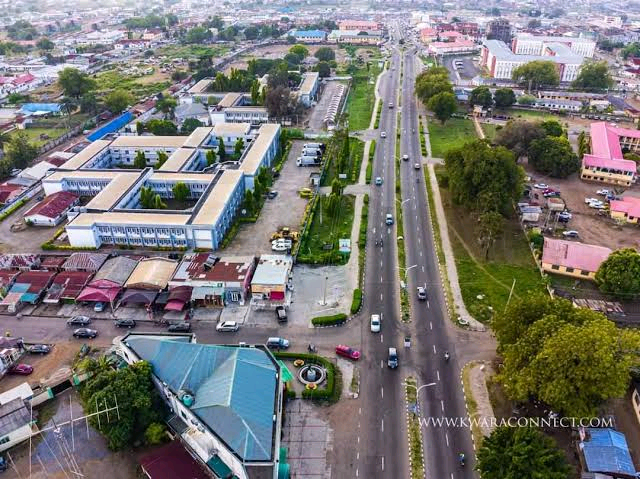Ilorin is the capital city of Kwara State, situated in the North-Central geopolitical zone of Nigeria, though historically and culturally, it is regarded as a Yoruba city. As of the 2006 census, it had a population of 777,667, making it the 7th largest city in Nigeria by population.
History
Ilorin was founded in the late 18th century by the Yoruba. It was initially a military outpost of the Oyo Empire, led by Kakanfo Afonja, who rebelled in 1817 with support from Shehu Alimi, a Fulani Islamic preacher. After a fallout, Alimi’s descendants took over, and Abd al-Salam aligned Ilorin with the Sokoto Caliphate in 1823. The city resisted British colonization until it was subdued in 1897 and became part of Northern Nigeria under British rule. With Nigeria’s state creation in 1967, Ilorin became the capital of Kwara State.
Demographics
Ilorin is ethnically diverse, predominantly Yoruba, with significant Fulani, Nupe, Bariba, Hausa, Igbo, and Kanuri populations. Its traditional ruler, the Emir of Ilorin, is of Fulani origin.
Religion
Ilorin is a religiously pluralistic city:
- Islam is dominant, reflected by the presence of the Ilorin Central Mosque, originally built in 1820 and reconstructed in 1981, with renovations completed in 2012 featuring 99 domes and 4 minarets.
- Christianity is widespread in urban areas. Churches include Catholic, Anglican, Methodist, ECWA, Redeemed Christian Church of God, and many Pentecostal denominations.
- Latter-day Saints (LDS) have had congregations in Ilorin since 1992.
Climate
Ilorin experiences a tropical savanna climate (Aw):
- Annual rainfall: 990–1,318 mm
- Hottest month: March, with temperatures between 33–37°C
- Climate trends show increased temperature and humidity since the 1970s.
Economy and Commerce
Ilorin is a commercial and industrial hub of Kwara State:
- Major industries: Dangote Flour Mills, Tuyil Pharmaceutical, Rajrab Pharmaceuticals, KAMWIL, and Olam’s cashew processing plant (largest in Africa).
- Natural resources: Limestone, dolomite, kaolin, clay, tantalite, and gold.
- Agriculture is significant, with fertile lands supporting various crops.
Transport
- Ilorin International Airport offers daily flights via Arik Air and Overland Airways.
- Railways and major highways link Ilorin to Lagos, Ibadan, Abuja, Port Harcourt, and other cities.
- Local transport: Taxis, Okada (motorcycles), Keke NAPEP (tricycles), and car-hire services.
Education
Ilorin is an educational center in Nigeria, hosting:
Universities
- University of Ilorin (Unilorin)
- Al-Hikmah University
Colleges and Institutions
- Kwara State College of Education
- Kwara State College of Arabic and Islamic Legal Studies
- Kwara State Polytechnic
- International Aviation College
- Federal Agricultural and Rural Management Training Institute
- Michael Imoudu Institute for Labour Studies
- School of Nursing and Midwifery
- National Centre for Agricultural Mechanization
Secondary Schools
- Ilorin Grammar School (est. 1914)
- Mount Carmel College
- Bishop Smith Memorial College
- Federal Government College, Ilorin
- Saint Anthony’s Secondary School
- U.M.C.A High School
- And many others.
Culture and Tourism
- Okuta Ilorin ("stone for sharpening iron") gave Ilorin its name.
- Sobi Hill: Used as a refuge in ancient wars.
- Traditional crafts: Notable pottery centers (e.g., Dada, Okelele) and aso-oke (hand-woven Yoruba textiles).
- Kwara State Council for Arts and Culture and Metropolitan Park are major cultural sites.
- Ilorin has Nigeria’s largest traditional pottery workshops and is a major center for aso-oke weaving.
Sports
- Home to Kwara United FC (NPFL) and ABS FC (NNL).
- Facilities include an 18,000-capacity stadium, Olympic-sized swimming pool, and West Africa's only standard baseball park.
Flood and Waste Challenges
- 2019 Flood: Severe flooding on 18–19 September damaged property along Unity and Obbo roads.
- Waste management issues: Overflowing refuse bins have caused environmental concerns and health risks in recent years.
